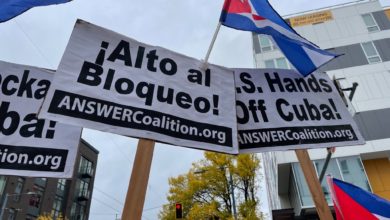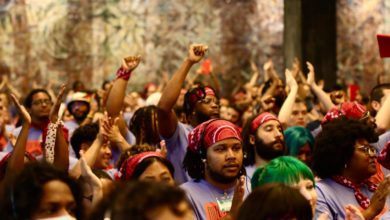Click here to see photos from the protest.
Click here to see video from the protest.
Over 600 people traveled from 30 cities across the United States to march in the first demonstration for five Cuban men serving long prison sentences for actively opposing U.S-supported anti-Cuba terrorists in Miami.
The demonstration received significant media coverage in the U.S. and international media. The Associated Press
|
Other media coverage in the build-up to the demonstration included important articles in the Los Angeles Times, the Miami Herald, the Washington Post and the New York Daily News. Telesur and other Spanish-language media provided excellent coverage of the Sept. 23 demonstration.
Movement rallies following 11th Circuit decision
The five men, Gerardo Hernández, Antonio Guerrero, Ramón Labanino, Fernando González, and René González, were convicted in June 2001 of espionage conspiracy charges. Although they won a new trial in August 2005, the plenum of the 11th Circuit Court in Atlanta reversed their court victory. Their attorneys are continuing the appeals process.
The march began at the Justice Department on Pennsylvania Avenue, where buses, vans and cars from New York, Philadelphia, Boston, New Jersey, Chicago, Ohio, Virginia, and other areas unloaded. The Justice Department was chosen because of U.S. attorney general Alberto Gonzales’s failure to classify Luis Posada Carriles as a terrorist, which could set the stage for his imminent release.
Protestors expressed their anger at Gonzales’s inaction and the continued incarceration of the Cuban Five, by chanting, “Jail Posada, free the Five!”
Victims of anti-Cuban terrorism honored in front of White House
A strong White House picket filled the entire sidewalk and spilled onto Pennsylvania Avenue. Before the march continued to the public forum at George Washington University, march leader Andrés Gómez conducted a solemn ceremony. Each of the names of anti-Cuba terrorist crimes was read, followed by the crowd shouting, “Justicia!”
Gómez read the 73 names of the passengers and crew onboard the Cubana airliner downed on Oct. 6, 1976 by mercenary bombs, the name of Orlando Letelier and Ronni Moffitt, of Fabio Di Celmo, killed by a mercenary bomb arranged by Posada, and of Carlos Muniz Varela, gunned down in Puerto Rico in 1979 by members of the police, who were paid by rightwing Cuban American terrorists.
The marchers proceeded to the indoor public forum, where family members of the victims of terrorism, among others, spoke.
The Five were fighting terrorism
Francisco Letelier, son of Orlando Letelier, who was assassinated 30 years ago by terrorists, said, “Today we know
|
Letelier continued, “People have asked me today, why are you here? To me it is very clear. The story of the Cuban Five is connected to an historical relationship throughout the Americas, of people pursuing sovereignty, the right to live in peace, self-determination, justice. That is why I am here today, one more voice, one more story, one more person that joins this much greater movement, a coalition amongst all of us.”
Livio Di Celmo noted, “It was Sept. 4, 1997, when I received a call from Havana. I could recognize my father’s voice, very different from his usual voice. He had just told me that my brother was killed by a bomb. A mercenary had been paid $5,000 for every bomb he was putting in Cuba. The man paying him was Luis Posada Carriles.”
Di Celmo said, “Fabio was sitting right next to the bomb, a piece of shrapnel cut his throat. By the time he got to the hospital there was not one drop of blood left in his body. Slowly but surely, I started discovering that Cuba had suffered over 3,400 innocent Cuban civilians being killed by terrorist groups from the rightwing Cubans living in Miami.
In my research, I found out about the struggle of the Five. My first thing to do was to write the Free the Five organization in the United States, and pledge my support to them, said Di Celmo. “We have developed a relationship ever since. My anger is vanishing slowly and I am very committed to help the cause of the Five.”
Political struggle essential
Leonard Weinglass, appeals attorney for the Cuban Five, explained the latest legal developments. Speaking of the appeals decision last year granting a new trial, Weinglass said, “That was a 93-page unanimous opinion, the longest opinion ever in the history of the United States on the issue of venue.
“We were very pleased with it. We rejoiced with that result, we prepared for the second trial, which we knew we could win. But Washington decided to appeal that decision to the entire eleventh circuit. The case was heard by 12 judges.”
|
Weinglass continued, “They reinstated the convictions on Aug. 9 of this year. There remain nine additional issues which now go back before two judges of the federal appellate court. Those judges, as we sit today, are considering those nine additional issues. We are hopeful that if these two judges consider these issues in a fair and reasonable way, that the case will yet be set aside and the convictions will be reversed.”
Weinglass emphasized the absolute necessity of political struggle: “In my experience with political cases such as this, the size of the support, the extent of the support, the breadth of the support is absolutely essential and critical to what happens in court. Lawyers are not listened in a case of this nature unless there are people outside of court who will stand up and stand with the Five,” said Weinglass.
“It is very important in this critical period of time that we all stand together in large numbers, making our position clear, encouraging others to stand with them, and to finally reverse this injustice and to send the Five home to Cuba.”
Breadth of support grows
Other speakers were Wayne Smith, ex-chief of the U.S. Interests Section in Havana, José Pertierra, Venezuela’s attorney for the extradition petition of Posada; Akbar Muhammad, international representative of the Nation of Islam; Heidi Boghosian, executive director of the National Lawyers Guild; Saul Landau, fellow, Institute for Policy Studies; Andrés Gómez, coordinator, Antonio Maceo Brigade; Peta Lindsay, youth organizer with ANSWER Coalition (Act Now to Stop War and End Racism); Gloria La Riva, coordinator, National Committee to Free the Cuban Five; and Cheryl LaBash for the National Network on Cuba.
The action was sponsored by the National Committee to Free the Cuban Five, la Alianza Martiana, the ANSWER Coalition, the National Lawyers Guild, the National Network on Cuba, the Nation of Islam, the FMLN and the GWU Progressive Student Union.
For more information on the case of the Cuban Five, visit http://freethefive.org/.
Part 1
Part 2








